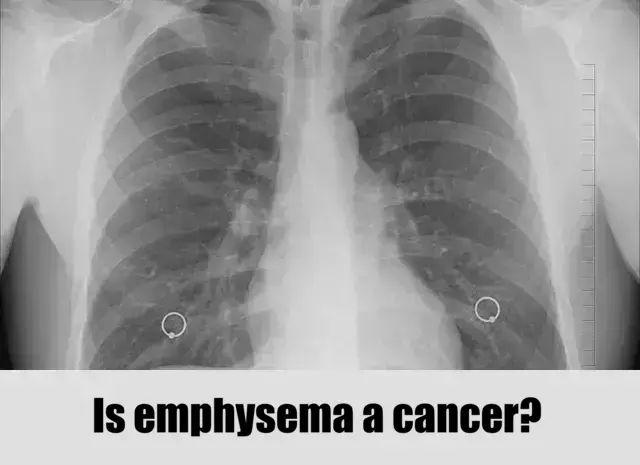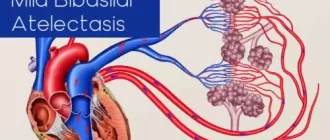Emphysema is a chronic lung disease that worsens with time, making it harder to breathe. The underlying cause of this illness is lungs with dysfunctional air sacs. While emphysema is not cancerous in and of itself, some research suggests that it may raise a person’s chance of getting lung cancer.
Chronic exposure to cigarette smoke, which includes a variety of carcinogenic compounds and particles, is one of the key causes of the development of emphysema and lung cancer. As a result of this contact, long-lasting inflammation sets in inside the lungs. This might harm lung tissue and raise the likelihood of developing lung cancer.
In order to effectively monitor and prevent lung cancer, an early diagnosis of chronic obstructive pulmonary disease (COPD), which is very similar to emphysema, is crucial. An earlier diagnosis of COPD would allow for better screening for lung cancer and a greater possibility of success in persuading individuals to quit smoking.
Is emphysema a cancer?
Emphysema is not a cancer but a lung disease characterized by damaged and enlarged air sacs in the lungs. Most people with this condition have been exposed to airborne irritants, including cigarette and marijuana smoke, chemical fumes, and pollution, over a lengthy period of time. Despite the fact that emphysema is not a risk factor for getting lung cancer, those who have it as a consequence of smoking or exposure to other toxins may already be at a higher risk of acquiring lung cancer.
While both emphysema and lung cancer cause damage to the lungs, these conditions are not equivalent and need separate therapies due to their unique root causes, presentation, and outcomes. Lung cancer begins when abnormal cells in the lungs multiply rapidly and out of control. Yet emphysema, a form of COPD that causes the death of tiny air sacs in the lungs, is an entirely different storyrate therapies due to their unique root causes, presentation, and outcomes.
Lung cancer begins when abnormal cells in the lungs multiply rapidly and out of control. Yet emphysema, a form of COPD that causes the death of tiny air sacs in the lungs, is an entirely different story.
There is evidence to suggest that smokers with COPD are at a higher risk of getting lung cancer, but it is probable that nonsmokers with COPD are also at risk. New evidence suggests that those with COPD, regardless of whether they have ever smoked or not, may be at an increased risk of acquiring lung cancer.
Emphysema severity is linked to a higher lung cancer risk.
A meta-analysis of 21 studies and over 107,000 people found that getting a computed tomography (CT) assessment for emphysema was linked to an increased chance of acquiring lung cancer. Emphysema detectable by CT scans is associated with a higher chance of getting lung cancer.
A lot more research has to be done before any changes can be made to the therapeutic therapy that is now being offered, despite the fact that smoking is a risk factor for both diseases. Studies are still being conducted to pin down the specifics of the link between emphysema and lung cancer. Chronic inflammation, genetic susceptibility, or both may have a link to propensity in the human genome.
Other risk factors for lung cancer
Emphysema is a chronic lung disease that destroys the air sacs, or alveoli, in the lungs over time. While this condition is not cancer itself, having it, especially in its more severe forms, may raise the chance of getting lung cancer. Since the year 2000, lung cancer has been the leading cause of cancer-related mortality in every area of the world, accounting for over a million fatalities annually.
In addition to smoking, which is a significant risk factor for both emphysema and lung cancer, other variables, such as genetic vulnerability, chronic inflammation, DNA damage, aberrant repair mechanisms, or a combination of these, may also contribute to the development of either disease.
Both emphysema and lung cancer include smoking as a key risk factor. While emphysema is not cancer itself, it is important to be aware of the risk factors that may be addressed to lessen the possibility of getting lung cancer.
About the Author
Reyus Mammadli is the author of this health blog since 2008. With a background in medical and biotechnical devices, he has over 15 years of experience working with medical literature and expert guidelines from WHO, CDC, Mayo Clinic, and others. His goal is to present clear, accurate health information for everyday readers — not as a substitute for medical advice.







